Best Guide For Yoga Mudras for Personality Development
-
Written By: Sukhvinder-chaitanya
- Published On:
- Last Updated: December 5, 2024
Are you interested in your self-improvement and personality Development? Have you heard about Yoga mudras for personality Development? If not then you are in the right place!
This is the most comprehensive guide to yoga mudras for personality development ever. In this guide, you will learn everything you need to know about the practice and implementation of yoga mudras for personality development in daily life.
By regular practice of these yoga mudras for personality development, many people have healed their physical, mental, and, emotional problems. These personality development yoga mudras will help you to enhance the quality of your life.
As a beginner or an advanced yoga practitioner, you may have questions or difficulties implementing personality development yoga mudras. This ultimate guide to yoga mudras for personality development will provide you with in-depth knowledge of the topic. Here you will learn:
- Why Personality Development is important?
- Significance of yoga mudras for Personality Development
- Five amazing yoga mudras for Personality Development
- How these simple yoga mudras for Personality Development can help you change and develop your Personality.
This is the most complete guide available on the internet. Let’s dive right in…
Table of Contents
Why Personality Development is Important?
The present 21 st century modern era is highly competitive and stressful, and this stress adversely affects our physical and mental faculties. Due to its competitive nature, we have to enhance our skills continuously. Thus, the fittest survive while the weaker one succumbs before life’s harder tests.
Our body and mind are immensely powerful, but we hardly use even a fraction of this power & energy. And also Due to stress, lack of confidence, fear, past failures, negative thought patterns, and psychological mental blocks we are not able to use the full potential of our minds.
Significance of Yoga Mudras for Personality Development
There are multiple courses and techniques available for personality Development and self-improvement but, I have chosen the ancient holistic science of yoga for Personality Development.
Our ancient sages and scriptures have suggested some yoga mudras to enhance our divine energy. These simple hasta yoga mudras help us to overcome obstacles coming in the path of our Personality Development & self-improvement. These simple yoga mudras will help you to enhance your mental and physical energy.
Different Types of Yoga Mudras for Personality Development
Five amazing yoga mudras for Personality Development are:
- Ankush Mudra
- Namaskar Mudra
- Soham Mudra
- Hakini Mudra
- Ganesh Mudra
- Kubera Mudra
Let’s explore each mudra.
What is Ankush Mudra?
Ankush Mudra
In Sanskrit, the word “Ankush” means to control, discipline, or restraint. And Ankush mudra helps to develop self-control also restrain the negative thoughts that hinder our personal growth. Ankush mudra is a combination of three tattva mudras, i.e. shunya mudra, Surya mudra, and Varun mudra.
How to do Ankush Mudra?
How to Practice Ankush Mudra?
To Practice Ankush Mudra, sit in a padmasana (lotus pose) or any comfortable posture, with a straight back. Now fold your middle, ring, and little fingers and press them slightly with the thumb. Keep your index finger straight.
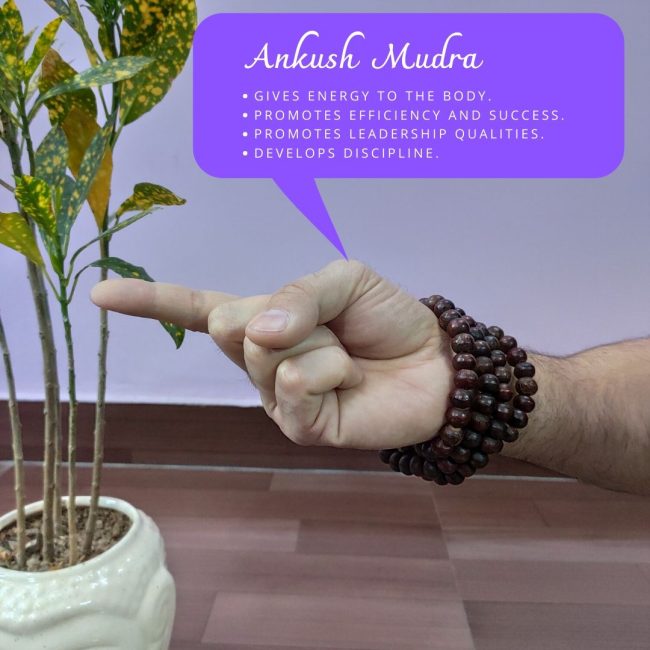
What are the Benefits of Ankush Mudra?
1) Ankush mudra gives energy to the body. So if you struggle with low energy levels then you must try Ankush mudra.
2) It does not matter how intelligent & hardworking you are if you lack self-disciple then success will stay away from you. Self Discipline is the basic ingredient for success.
Ankush mudra helps to develops discipline.
3) Ankush mudra increases the efficiency of the brain and body and also promotes success.
4) Ankush mudra promotes leadership qualities. So if you are low on confidence then you must try Ankush mudra.
5) I will highly recommend Ankush mudra to students and executives.
What is the Time Duration for Doing Ankush Mudra?
Practice Ankush mudra for 5 to 15 minutes daily sitting in padmasana or sukhasana. This mudra is very useful for students and executives.
Do you want to manage your stress, anxiety? Do you want to heal yourself at physical , mental and emotional level? Become A Certified 200 Hours Yin Yoga And Meditation Teacher. Join the coolest Yin Yoga Training India course exclusively designed for the complex modern mind of this 21st century.
The duration of this Yin yoga training and meditation certification course is 25 days. Stay in a beautiful resort in Goa, close to beach, or Dharmshala, close to Himalayas. Our yoga teacher training course will provide a unique opportunity for self-discovery, and personal growth.
Get ready to experience the flavor of real joy, peace, contentment & silence. Learn to design yin therapy sequences. Book Now!
Start your Yoga Journey to Transform your Life !
What is Namaskar Mudra?
Namaskar Mudra
Namaskar is a way of greeting each other in Indian and other Southeast Asian cultures. People belonging to different cultures and religions use namaskar mudra as a way of greeting each other.
Namaskar mudra has a huge scientific and spiritual significance in India. Namaskar Mudra is also known as Anjali Mudra or namaste mudra. This hand gesture is practiced in meditation, yoga asana, prayers, aarti, ardaas, and kirtan practices.
The meaning of namaskar is “The divine in me, bows to the divine in you”
How to do Namaskar Mudra?
How to Practice Namaskar Mudra?
Join both of your hands together with thumbs, fingers close together in front of your heart. Do not press your palms, just keep a natural distance between them. You can practice this mudra in meditation or prayers.
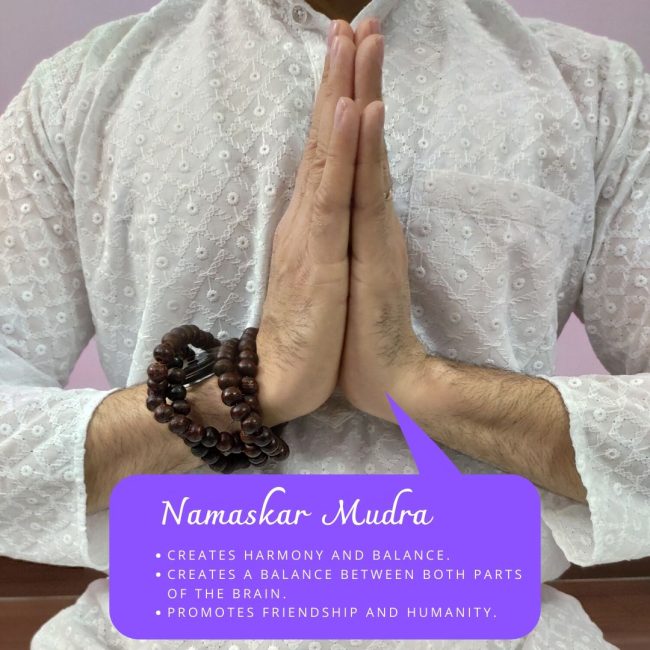
What are the Benefits of Namaskar Mudra?
1) Namaskar Mudra creates harmony and balance. Our hands represent the two parts of the brain and the sensory receptors on the hands communicate with the brain and stimulate both the hemispheres of the brain.
When we join our hands in the namaskar mudra, it creates a balance between both parts of the brain. This is the reason that namaskar mudra is also known as Samyuktha Hasta mudra, a gesture that uses both hands.
2) Namaskar mudra can be used as a therapeutic mudra for the cure of stress and anxiety it reduces anger and bringing mental peace and calmness.
3) It promotes friendship and humanity since it teaches surrender and letting go of our ego.
4) If Namaskar mudra is practiced at Heart Chakra (Anahata Chakra) with the thumbs touching the sternum then it stimulates organs situated above the diaphragm such as the lungs and heart. It also energizes and heart Chakra.
5) To increases your focus and intuition practice Namaskar mudra with the thumbs touching the center of the eyebrows. It also stimulates the Ajna Chakra (Third Eye Chakra).
6) When both hands are present press together in this Mudra, it creates a balance among all the five elements.
What is Soham Mudra?
Soham Mudra
The Sanskrit word “Soham” is the combination of two words: Sah (he) and Aham(I). The Meaning of the word Soham is “I am He” or my Individual Self is Universal Self.
“I” is referred to the individual self and ” He” is referred to God, Brahm, divine, universal consciousness, existence, cosmos.
How to do Soham Mudra?
How to Practice Soham Mudra?
To Practice Soham mudra, sit in any comfortable posture. For example padmasana ( Lotus pose) or any crosslegged posture or vajrasana with a straight back.
Now place the thumb at the base of the little finger. Fold all the other fingers and place them over the thumb to make a closed fist. Gently close your eyes and inhale deeply and start chanting the “OM” mantra or ” Soham” mantra.
If you don’t want to chant these mantras then you can do humming. Repeat chanting of mantras or humming 7 to 21 times.
When chanting and humming is over, contract your abdomen with exhalation to apply uddiyan bandha. Hold for some time as per your comfort level. Gently release the bandha with a deep inhalation.
Gently open your hands, and visualize that all your negative thoughts, pain, fear, anxiety, helplessness, inferiority complex, and other negative emotions are vanishing.
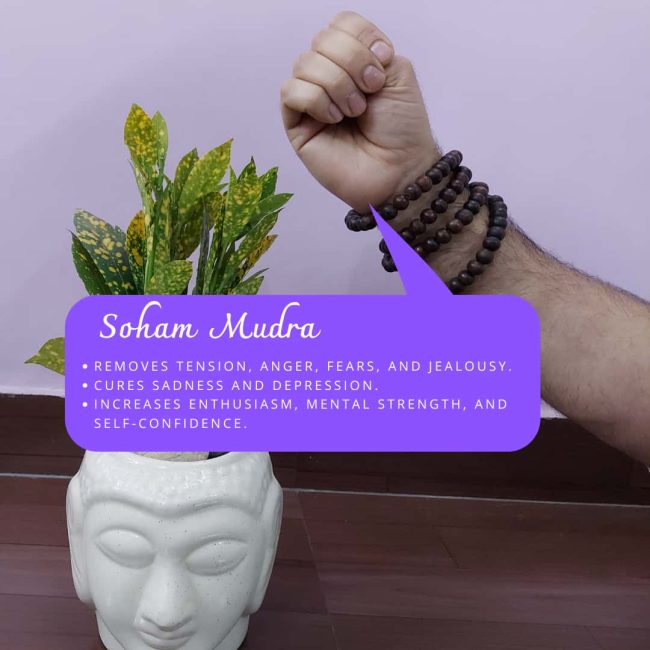
What are the Benefits of Soham Mudra?
1) Soham mudra is an excellent mudra for meditation since it removes tension, anger, fears, jealousy, etc.
2) This mudra removes sadness and cures depression.
3) Soham mudra helps in removing negativity from the body and mind. Regular practice of Soham mudra help in maintaining a positive aura and energy.
4) It energizes the body and mind, increases enthusiasm, strengthens the brain, increases mental strength, and thereby increasing self-confidence.
5) Practice of Soham mudra activates the brain. Further, it helps to maintain proper water balance in the blood and brain. Insufficient balance of water in the blood and brain can lead to sadness, depression, and Alzheimer’s disease.
What is Hakini Mudra?
Hakini Mudra
The Hakini Mudra is named after the Hindu Goddess Hakini, this mudra is mostly practiced during meditation. The Sanskrit word Hakini means “power” or “rule.” Hakini Mudra helps the practitioner to gain power and control over their mind.
How to do Hakini Mudra ?
How to Practice Hakini Mudra?
To Practice Hakini Mudra, sit in any comfortable posture with a straight back. Now Join the tip of all the fingers & thumbs of both hands with each other, keeping the palms apart.
Bring your awareness and Drishti (Gaze) between the eyebrows (Third Eye). Inhale deeply through the nose and touch the tongue at the roof of your mouth (Soft Palate) Exhale deeply through the nose and allow your tongue to relax.
Time Duration for Practice of Hakini Mudra
Practice Hakini mudra for 30 minutes daily. If you cannot manage 30 minutes in one go then you can divide it into three slots of 10-minute each.
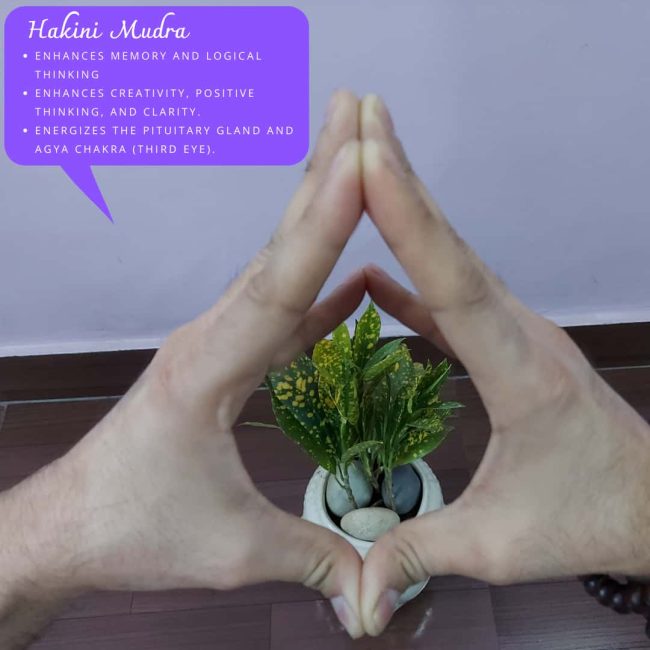
What are the Benefits of Hakini Mudra?
1) Hakini Mudra energizes the pituitary gland and Agya chakra i.e Third eye. This mudra helps to develop Intuition. Goddess Hakini is considered the god of the Pituitary gland, so this mudra is named after her.
2) Regular Practice of Hakini Mudra activates the right side of the brain. Further, it helps to enhance memory and logical thinking.
3) Hakini Mudra creates synergy, a balance between the right and left hemispheres of the brain.
4) Pituitary gland is the master gland in the human body. It regulates our thinking power, it triggers creative ideas. So the practice of Hakini Mudra enhances creativity, memory, clarity and, positive thinking. This Mudra is a master mudra for teachers, students, and thinkers.
5) In case if you are forgetting important things, or if you want to recollect old information/memories from the brain then you should try Hakini Mudra.
What is Ganesh Mudra??
Ganesh Mudra
Ganesha or Bhagwan Ganesh is a Hindu god. ” Son ” of Lord “Shiva.” Worshipping Ganesha before starting any auspicious work is a tradition in Indian Hindu philosophy. Ganesha is also known as Vighnakartra (the creator of obstacles) as well as Vighnaharta (the destroyer of obstacles).
Hence he is worshipped first so that he may destroy any upcoming obstacles. This mudra is dedicated to Ganesha since it does the same work as Ganesha’s worship.
How to do Ganesh Mudra?
How to Practice Ganesh Mudra?
To Practice Ganesh mudra, sit in any comfortable posture with a straight back. Now hold both hands together, in such a way as to create a grip with your fingers. Move your interlocked fingers and hands in front of your chest.
Keep your elbows stretched horizontally with shoulders relaxed. Inhale deeply and stretch your hands to intensify your grip. Make sure all the fingers and thumbs are close together without any gap between them.
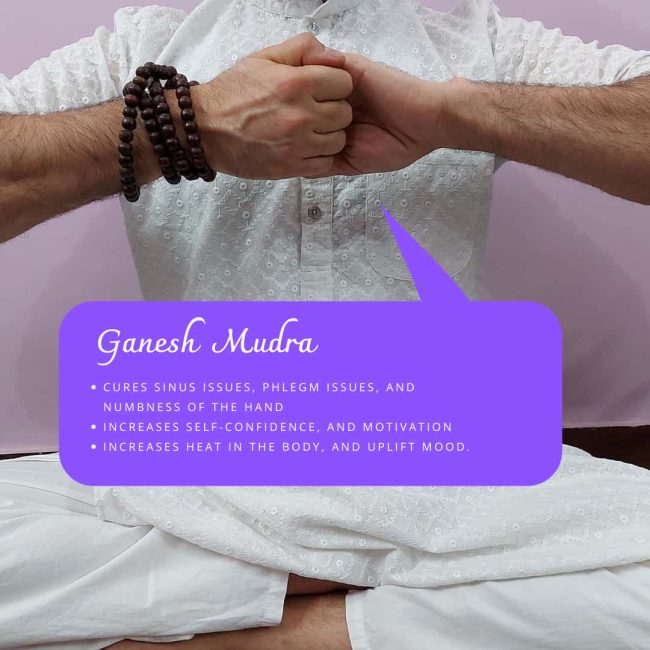
What are the Benefits of Ganesh Mudra?
1) Stretching our hands in this mudra strengthens our fingers, hands, wrist, elbows, and shoulders. This mudra provides strength & elasticity to all the muscles and nerves in this region of the body.
2) Practice of Ganesh mudra eliminates shaking, jerking, and trembling of hands. Further, it removes the numbness of hands and promotes blood circulation from fingers to shoulders.
3) Our fingertips contain SINUS pressure points. The practice of Ganesh mudra triggers these sinus points. Further, it helps in common cold, cough, sinusitis, and bronchitis. This mudra also helps to remove the accumulated phlegm from these cavities.
4) Practice of Ganesh mudra increases heat in the body. People suffering from cold hand syndrome should practice Ganesh mudra to bring warmth to their hands.
5) When our hands are stretched in Ganesh mudra in front of the heart center, it activates the Anahat chakra ( Heart center) and thymus gland situated behind the heart. Anahat chakra (Heart center) also controls the functioning of the lower three chakras i.e. Manipura chakra, Swadishthan chakra, and Mooladhara chakra. Therefore Ganesh mudra stimulates all these four chakras.
Conclusion
I hope you will practice these yoga mudras for personality development in your day to day routine to enhance to personality. I hope you liked this post. Now I will like to hear from you. What did you think of today’s post?
Or maybe if you have a question about any of the yoga mudras for personality development. Let me know by leaving a comment below.
Do you want to upgrade your yoga teaching skills? searching for a best yoga school to develop yourself as a confident yoga teacher? Yoga Chaitanya International Institute is one of the leading Yoga Teacher Training schools in India. They provide unique courses and programs that gives a transformational life-changing experience.
They teach different multi-style yoga teacher training programs. They offer 200 Hour Multistyle Yin Yang Yoga Teacher Training. 200 Hour Yin Yoga & Meditation Teacher Training, and 200 Hour Yoga Therapy Teacher Training. There teacher training will enable you to explore a variety of yoga styles.
“Choose your Yoga Teacher Training”
Start your Yoga Journey to Transform your Life !

About the Author: Sukhvinder Singh Chaitanya
Sukhvinder Singh (Chaitanya) is an experienced yoga teacher. (ERYT-500 & YACEP with 20,000+ hours of teaching experience) He is a master yoga teacher in Ashtanga Vinyasa Yoga, Vinyasa Flow, Hatha Yoga, Yin Yoga, Iyengar Yoga, Ayurveda & Laughter Yoga. He has been teaching yoga, laughter yoga & meditation all across the globe in teacher training programs, workshops & corporate sector for almost 10 years. He's the founder and director of the Yoga Chaitanya International Institute, a leading Yoga Teacher Training school in the world. He shares his expertise in his blogs and his YouTube Channels.

3 thoughts on “Best Guide for Yoga Mudras for Personality Development”
Kuber mudra or prana mudra dono Kiya ja sakta hai kya
Yes , haanji you can do both
Han